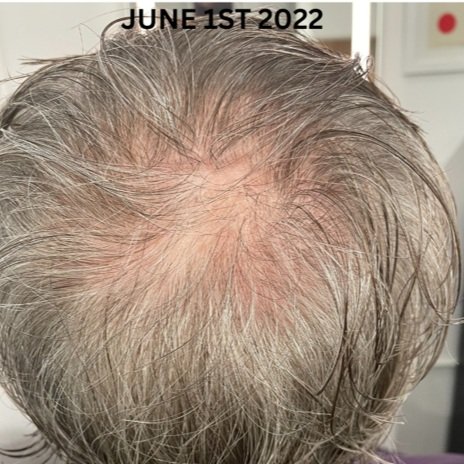
You may have Alopecia.
Alopecia is a hair loss condition that can happen for reasons including genetics, autoimmune issues, or other factors. It can manifest in different ways, such as patches of hair loss or gradual thinning of the hair.
As a trichologist, I understand the social and emotional impact of scalp conditions and hair loss. Book a scalp analysis with me and find out if you have Alopecia, which type you might have, and how to treat it effectively.
Before
After continued use of topical Minoxidil
ANDROGENETIC ALOPECIA
is a common genetic condition that causes hair thinning and eventual hair loss, primarily on the scalp. Book a scalp analysis to understand how you can slow the hair loss down and understand what treatments are available for you to use at home.
Before
After
Alopecia areata
is a hair loss condition where a person’s immune system attacks their hair follicles, causing them to fall out in small, round patches. This type of alopecia could impact other hair-bearing areas of the body like eyebrows, eyelashes, and beards.
Before
After
Diffuse Alopecia
is a treatable condition caused by a disruption in the hair growth cycle. It is often caused by stress, changes in medication, and a drastic diet. Book today with a trichologist to find out what has caused your hair shedding and how to make the changes needed to stop more shedding.
Cicatricial alopecia
is a type of hair loss where the hair follicles are permanently damaged and replaced by scar tissue. The key is early detection to stop the destruction of the follicles early on.
Traction Alopecia
is a type of hair loss that happens when there’s repeated pulling or tension on the hair follicles. It can occur due to tight braids, ponytails, ballerina buns, or hair extensions.
Postpartum Alopecia
is a temporary hair loss that occurs after giving birth. Many women experience changes in their hormones post-partum that can cause sudden shedding.
Keep taking your prenatal vitamins. The good news is the hair will grow back. It will take about three months. Reach out for more information.
get in touch
Book your scalp analysis to determine what treatment plans will work for your hair and scalp conditions. I promise you an honest diagnosis and will recommend you to leading specialists if needed.









